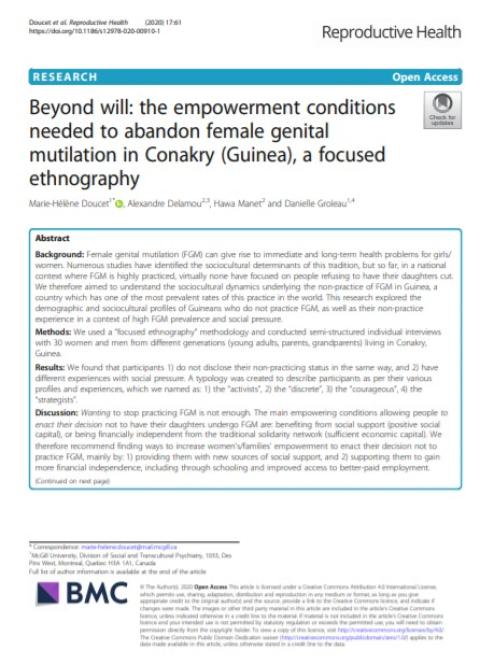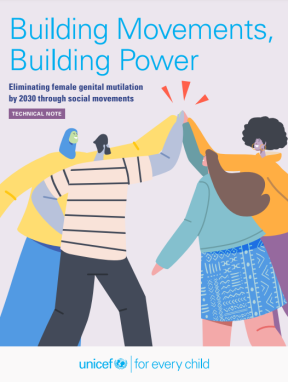- Journal article
- 6 Mayo 2020
Beyond will: the empowerment conditions needed to abandon female genital mutilation in Conakry (Guinea), a focused ethnography
- Published by: Reproductive Health Journal

Abstract
Background
Female genital mutilation (FGM) can give rise to immediate and long-term health problems for girls/women. Numerous studies have identified the sociocultural determinants of this tradition, but so far, in a national context where FGM is highly practiced, virtually none have focused on people refusing to have their daughters cut. We therefore aimed to understand the sociocultural dynamics underlying the non-practice of FGM in Guinea, a country which has one of the most prevalent rates of this practice in the world. This research explored the demographic and sociocultural profiles of Guineans who do not practice FGM, as well as their non-practice experience in a context of high FGM prevalence and social pressure.
Methods
We used a “focused ethnography” methodology and conducted semi-structured individual interviews with 30 women and men from different generations (young adults, parents, grandparents) living in Conakry, Guinea.
Results
We found that participants 1) do not disclose their non-practicing status in the same way, and 2) have different experiences with social pressure. A typology was created to describe participants as per their various profiles and experiences, which we named as: 1) the “activists”, 2) the “discrete”, 3) the “courageous”, 4) the “strategists”.
Discussion
Wanting to stop practicing FGM is not enough. The main empowering conditions allowing people to enact their decision not to have their daughters undergo FGM are: benefiting from social support (positive social capital), or being financially independent from the traditional solidarity network (sufficient economic capital). We therefore recommend finding ways to increase women’s/families’ empowerment to enact their decision not to practice FGM, mainly by: 1) providing them with new sources of social support, and 2) supporting them to gain more financial independence, including through schooling and improved access to better-paid employment.
Conclusions
This study was the first to explore the experience of people who do not practice FGM in a context of high FGM prevalence and social pressure. The results and recommendations of this research can inform strategies for FGM abandonment and therefore contribute to improving or developing intervention strategies that promote the health and well-being of girls and women.
-----------------------------------------------------------
Résumé
Contexte
Les mutilations génitales féminines (MGF) peuvent nuire à la santé des filles/femmes. Plusieurs études ont identifié les déterminants socioculturels de cette tradition, or aucune n’a focalisé sur des personnes vivant dans un contexte où les MGF sont hautement pratiquées et qui refusent de faire exciser leurs filles. En Guinée, la prévalence des MGF est très élevée et la pression sociale pour faire exciser les filles est forte. Cette recherche a donc exploré les profils démographiques et socioculturels, et l’expérience de Guinéens qui ne pratiquent pas les MGF.
Méthodes
Nous avons utilisé une méthodologie « d’ethnographie focalisée », et mené des entretiens individuels semi-structurés avec 30 femmes et hommes de différentes générations (jeunes adultes, parents, grands-parents) vivant à Conakry, en Guinée.
Résultats
Nous avons constaté que les participants 1) ne divulguent pas tous leur statut de non-pratique, et 2) ont différentes expériences de pression sociale. Nous avons créé une typologie pour les décrire selon leurs différents profils et expériences, et les avons surnommés ainsi: 1) « activistes », 2) « discrets », 3) « courageux », 4) « stratèges ».
Discussion
Vouloir abandonner la pratique des MGF ne suffit pas. Les principales conditions permettant aux participants de mettre en oeuvre leur décision de ne pas faire exciser leurs filles sont: bénéficier de soutien social (capital social positif), ou être financièrement indépendant du réseau de solidarité traditionnel (capital économique suffisant). Nous recommandons donc de trouver des moyens pour accroître l’autonomisation des femmes/familles pour qu’elles puissent mettre en œuvre leur décision de ne pas faire exciser leurs filles, principalement en les soutenant pour accéder à 1) du soutien social, et 2) l’indépendance financière, y compris par la scolarisation et l’accès à des emplois mieux rémunérés.
Conclusions
Cette étude a été la première à explorer l’expérience de personnes qui ne pratiquent pas les MGF dans un contexte de forte prévalence des MGF et de pression sociale. Les résultats et recommandations de cette recherche peuvent éclairer les stratégies d’abandon des MGF et ainsi contribuer à améliorer ou à développer des stratégies d’intervention qui favorisent la santé et le bien-être des filles/femmes.
- Countries / Regions:
- Guinea
Related resources
Briefing paper
5 Noviembre 2025

Report
3 Marzo 2023

Briefing paper
1 Octubre 2022
